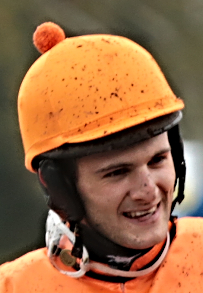Váňa junior: After his win at Treviso, Roman will run at Milano, and then we’ll park him away

This interview, written by Petr Guth, first appeared on February 27th on the Dostihový svět website. While top Italian jumps trainer Paolo Favero has been serving a suspension, and while most of the smaller Czech trainers have been taking a long winter break, Josef Váňa senior has had a series of horses in full training throughout the winter and has been taking them to run mainly in Italy, where they have been winning race after race. Váňa has a number of Italian owners of chasers, who naturally want their horses to run in Italy, where there is steeplechasing at Merano, Milano, Pisa, Grosseto and Treviso racecourses. Merano is less than an hour away from the end of the Brenner pass, and is reasonably accessible for our trainers and jockeys. The other courses can also be reached by a determined team, and no team is more determined than the Váňa team, key members of which are Váňa’s wife, Pavla, and his son, Josef junior.
While Josef senior was never a stylish rider, and was well into his thirties before he rode his first race, as an amateur, he has given his son every opportunity to develop from childhood into a top jockey and in future, very likely, into a top trainer. When Josef junior was a promising teenager, the stable jockey was Josef Bartoš. He, too, has had a strong and beneficial influence on young Josef.
Josef Váňa junior is currently the leading jockey over fences in Italy for 2017.
Czech emissaries have an excellent Saturday behind them at European racecourses. While Greg Wroblewski’s two horses excelled themselves at Fontainebleau, in France, taking one first place (Terapena, ridden by Jan Faltejsek) and one second place, there was what we are coming to think of as an almost routine win in Italy for the team around trainer Josef Váňa, this time at Treviso. The winning horse this time was 5-y-o Roman, which was winning for the 4th time in Italy. Váňa was the only rider that afternoon to finish ahead of Josef Bartoš, who rode two winners and one 2nd-placed finisher in the afternoon.
“I think we’ve worked out what’s right for Roman,” Váňa states. “He’s a horse that we’ve tried at Merano, but the races there didn’t suit him, and he struggled. He gets on better at Milano or at Pisa, and now at Treviso, too. The race was suitable for us,” says Váňa, praising his horse, for which the connections have chosen a comparatively easy path at the present time.
“This is fine for him for now. It’s clear that he has a certain level. He might have run in a group-race level at Pisa, but in the end we decided to take this route, and I think it was a good choice for him. Winter training suits him, and I’d say that we’ll be considering sending him to Milano next, and then we’ll park him away for a few months, and we won’t run him in the summer,” Váňa junior says, indicating that there will be the same tactics for Roman as for the yard’s top hurdler, Roches Cross.
As for the race at Treviso, the competition at this Italian provincial racecourse was not as strong as at Pisa, but Roman’s win still counts for something. “Of course, the feeling would be even better if prize money was being paid out the way it should be,” Váňa complains. However, horses from the Váňa training centre in West Bohemia will be continuing to visit Italian destinations, irrespective of the delayed payments at the present time.
“The fact is that we have quite a strong group of Italian owners, and they quite simply want their horses to run in Italy,” Váňa says. This is a factor that to some extent restricts considerations about possible trips to France. “What Greg’s horses pulled off is just fine. I congratulate him on this success. He prepared himself excellently for France, and, in addition, he found ideal races for the horses to run in. Everything came together,” Váňa smiles. “Of course, France is a lure for us, too, and I take what he managed to do there as a bit of a challenge for us. I’m sure we’ll be thinking seriously about sending some horses to run in France,” he adds.
***
Interview by Petr Guth, translation and extra text by Robin Healey
